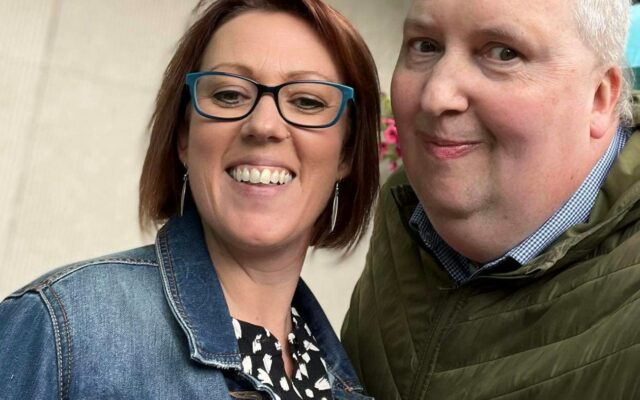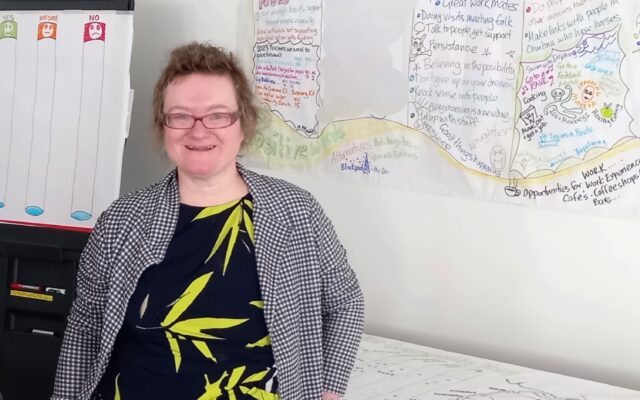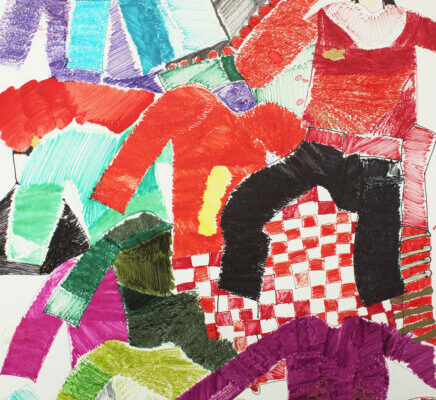Frustrated at not being able to find a school that offered help to her autistic son with his communication problems, Zoe Thompson set up her own school Bright Futures using an American idea, RDI. Seán Kelly talked to her about her brave initiative.
When Zoe Thompson was looking for a school for her autistic son she could not find one that offered help with his social communication needs. So she started one herself. “As you do”, she says, laughing.
Of course, this is an absurd shortening of the journey which led to the opening a few years ago of Bright Futures School in Oldham and Zoe’s current position there as Head of Development. Perhaps the story really starts further back, 12 years ago when her (then) 5-year old son received a diagnosis of autism. Zoe had been looking at what was provided by the local authority and the medical profession. “But there was nothing on offer that made any sense to me in terms of what I wanted for our lad”, she says.
One night she was awake at 3am doing an internet search. She came across an American initiative called Relationship Development Intervention or RDI (these days Zoe often just refers to it as ‘guiding’) and she went immediately to wake her husband up. “I just thought, that’s it, that is it!”.
Parent-guides
So the family went off to America for Zoe and her husband Dixon to become trained as RDI parent-guides and also for her son to be assessed. She took both her boys and her aunt and uncle to look after them while they were training. Back in England she continued receiving supervision from a consultant in America. The process involved Zoe sending video-tapes of her interactions with her son. Nowadays, of course, guides can upload digital videos onto the RDI platform (online learning and communication system) for much speedier feedback.
What is RDI?
RDI is a social communication intervention for children and young people with autism. It is one of the few which meets the relevant NICE (National Institute for Clinical Excellence) guidelines. Zoe describes it as a personalised and respectful approach, usually to a child with developmental gaps. The aim is to assist that person to “master missed milestones” in their social communication development.
Zoe outlines the key tools as:
- The setting of limits and boundaries;
- Going slowly and not putting pressure on the child;
- Giving them opportunities to step into a role.
It is important that the child has a ‘co-regulatory’ role. She gives an example of a game in which an adult and child are playing by rolling a ball to each other. When the adult first rolls the ball they are in the ‘sender’ role and the child is the ‘receiver’. When the child rolls the ball back they have swapped roles so now the child is the ‘sender’ and the adult the ‘receiver’. There is some freedom in such a game; for example, both of them can roll the ball fast or slow, but there are expectations too, for example, that each will try to make sure the other person can reach the ball.
Zoe describes the game as a metaphor for social communication. A conversation is much the same – both sides must take responsibility for what is happening, take their turns and adjust their roles as needed. In the game, if the ball goes out of reach, one of the players must initiate a ‘repair’ by going off and getting the ball.
An important bit of learning for those supporting children with autism is that a child can be given an opportunity to repair a breakdown in social communication simply by the adult pausing to allow the child time to think about what needs to happen and then the interaction can continue successfully.
An important element of RDI/Guiding is the use of ‘Declarative Communication’. The guide ‘declares’ (ie. describes) how they are feeling about the current situation. There is a great example in one of the video clips on Zoe’s blog (see link below): Jo is reading a book to Lucy and then Lucy turns herself upside down on the sofa. Jo just says, “I can’t read it when you’re upside down”. This feels different to the kind of instructions or demands that might happen in ordinary education. Jo is not instructing or criticising but is simply explaining what is needed if they are going to engage. Shortly afterwards Lucy turns herself the right way up and they can read the book together.
Effective
Zoe tells me that the aim is for the child to learn that sharing and working with others can be really enjoyable and can make them feel more competent. Declarative Communication can also be very effective non-verbally; for example, holding hands out in a welcoming gesture.
All this led to the plan to open Bright Futures School with her son as a pupil. “It seemed to be the only way to get what we wanted for him”, she says.
Bright Futures opened in 2010. The RDI work is integrated not an add-on. Zoe is clear:“If the child hasn’t mastered joint attention (in psychology that is a precursor to the development of speech and other communication milestones) then there is no way you are going to get them to sit down and look at a blackboard”. It seems to me that RDI could be called pre-education skills.
Between them Zoe and her husband had health and local authority experience and met as funding officers at what is now the Big Lottery so they knew about funding applications and business plans. Still it must have been a challenge starting a school? “It was a tumultuous road … with lots of mistakes,” she says. “I would do it better if I did it again but we have now got a thriving school”.
Outstanding
I wonder how open Ofsted were to the school’s approach but it turns out that they weren’t really interested in the RDI element and did not really see it as educational. However, Ofsted do cover Behaviour and Social Development and the school was judged outstanding on that, despite having only been open for about a month at the time of inspection.
To Zoe the social communication side is at least as important as the educational side. She sometimes has to point out to parents that while it would be nice for their child to get a degree it’s no good if they have a meltdown when the gasman comes and asks lots of questions or if they can’t maintain meaningful employment because they can’t work as part of a team. “Ultimately, if you haven’t got friendships and social reciprocity what is your quality of life going to be?”, she says.
There are currently only eight certified RDI/Guiding Consultants in the UK. Prospects for increasing that number are very limited because there is no-one with any remit for promoting the approach. However, RDI/Guiding is intended to be a parent-led intervention and much support is available on-line. The parent is the child’s guide. The consultant is the parent’s guide. At Bright Futures School staff act in the parent/guide role.
Zoe says that to be properly effective the same approach should be used at school and at home. She has been helping parents make the case in their children’s Education, Health and Care [EHC] plans for a funded RDI programme at home. She will soon be going to an SEN tribunal to do the same for her own son. Her message is: “Make sure you get the core autism difficulties listed in the ‘needs’ section of the EHC Plan. If the ‘needs’ are written correctly, then social communication provision should follow. I have challenged our LEA. If I win this tribunal I will be shouting from the rooftops so that other families can benefit”.
A parent who becomes a guide can be supported via Skype. There are parents from all over the world on the RDI platform. There is a cost, though, and RDI is a trade-marked intervention. Zoe has no problem with that. Her view is that, in the absence of other sources of income, why shouldn’t the creators of RDI charge? “You do get people saying that people shouldn’t be making money out of it. Well, if they weren’t making money out of it how are they going to develop it?”
Health and local authorities are often reluctant to fund this approach saying it is not yet a fully tested and accepted model. Zoe accepts that RDI /Guiding has not been extensively peer-reviewed (ie. by other academics) and that relatively little research has been carried out. She says there has been no big research funding from pharmaceutical companies, probably because they see no prospect of big profits. Meanwhile, peer-reviewed research by academics can take 20 years or more so what do you do in the meantime? She says anecdotal evidence is building about the effectiveness of the approach. As an example, the two video clips of Lucy at Bright Futures School show an amazing transformation in one year, far more than one would expect in that timescale. “It depends how you define evidence. For me, I just look at that video of Lucy”, she says. “Isn’t that enough?”
In his early years Zoe’s son had a lot of challenges which her family has been able to work through thanks to RDI. She is involved in the 7 Days of Action campaign and is aware of the world of the Assessment and Treatment Unit (ATU). At one point her local authority was considering a placement in a residential school for her son. Looking back, she can see how this could easily have led to an ATU admission. “It would have been the worst thing possible for him. I always say what I have done is saved my child from an ATU”.
Zoe is keen to point out to me that RDI /Guiding works just as well with children with learning disabilities and that sometimes it is easier to work with a non-verbal child than with one who is verbal. One problem for RDI is that it is still very much ‘under the radar’ and few people in the UK have heard of it. Zoe would like more parents to be aware of it and would love to see it featured at, for example, a National Autistic Society Conference, so more people could find out about it.
Invitation
I say to Zoe that RDI/Guiding seems to be about offering an invitation to join in. “Yes, that is always the way and if they don’t join then you just wait. Or you might say I can see you’re struggling at the moment – I am just going to give you five minutes and we can talk if you want when I come back. What you’re giving them there is space to deal with their emotions. It is important that the child learns to regulate their own emotions because if they can’t regulate themselves, they can’t engage”.
I like the style. It seems the kind of approach one could usefully take with any withdrawn child – or indeed anyone, including me! “Oh, yes,” says Zoe, laughing. “It even works with husbands”.
More information about Bright Futures School: www.brightfuturesschool.co.uk
Zoe’s Blog with the video clips of Lucy: http://notnigellanotjamie.blogspot.co.uk/2016/07/using-guiding-to-help-engagement-and.html





